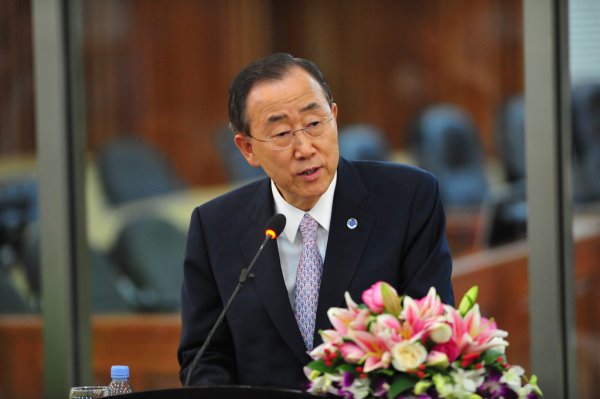| Unrepresented Nations and Peoples Organization (UNPO) |
| July 18, 2012 |
| Hague |
 |
|
18 July, The Hague – Upon learning that UN Secretary-General will be on a visit to the People's Republic of China this week, the UNPO (Unrepresented Nations and Peoples Organization) Presidency is urging Mr. Ban Ki-moon to raise concern on the ongoing human rights abuses faced by Mongolians in Inner Mongolia, Tibetans in Tibet and Uyghurs in East Turkestan in his talks with the Chinese leadership.
Population transfers of Chinese settlers into their homelands pose one of the greatest threats to the very survival of the religious, cultural and national identity of Mongolians, Tibetans and Uyghurs. Their human rights and fundamental freedoms continue to be systematically violated as recently shown during China's never-ending brutal crackdowns on protests of 2008 in Tibet, 2009 in East Turkestan and 2011 in Inner Mongolia, which have resulted in high numbers of arbitrary detentions, prison sentences and enforced disappearances.
In September 2009, Ms. Navanethem (Navi) Pillay, the UN High Commissioner for Human Rights, reported to the the 12th session of the UN Human Rights Council (HRC) when focusing on specific overarching issues that “form the roots of chronic human rights conditions as well as emergencies”. At an early stage she stated: “I followed with concern the recent disturbances in the Xinjiang Autonomous Region and those previously in the Tibetan Autonomous Region and surrounding areas. While condemning such violence and urging the Chinese authorities to respect human rights in upholding the law, I also encourage them to reflect on the underlying causes of such incidents, which include discrimination and the failure to protect minority rights.”
Weeks after Ms. Pillay's statement, the UN Committee on the Elimination of Racial Discrimination (CERD) urged the Chinese authorities to find out the “root causes” of the protests which erupted on the Tibetan Plateau in 2008 and in East Turkestan in July 2009 and recommended that China “carefully consider the root causes of such events, including inter-ethnic violence, and the reasons why the situation escalated.”
Efforts to settle nomadic herders in the name of grassland protection are euphemistically described as “ecological migration” by the People's Republic of China. But a Mongolian rapper sang last year, “Overgrazing is a myth and a lie/ We have grazed animals here thousands of years/ Why has the desertification started since only a few decades ago?” Traditional grazing had become part of the grassland ecosystem, and preventing it has promoted not natural restoration but further degradation. The Central Tibetan Administration (or “Government in Exile”) argues that both the social and ecological effects of the similar policies enacted in Tibet have been devastating, and that their real purpose is to clear the way for further mining.
In this respect, UNPO urges Mr. Ban Ki-moon to also follow-up on the recommendations by the UN Special Rapporteur on the right to Food that China: «Suspend the non-voluntary resettlement of nomadic herders from their traditional lands and the non-voluntary relocation or rehousing programmes of other rural residents, in order to allow for meaningful consultations to take place with the affected communities, permitting parties to examine all available options, including recent strategies of sustainable management of marginal pastures.»
We believe the UN Secretary-General has the independent mandate to speak up with the Chinese authorities about the grave human rights situations faced by Mongolians, Tibetans and Uyghurs living in territories under China rule today. The Chinese authorities must be urged to receive the UN High Commissioner for Human Rights on a fact-finding mission that includes enough time for the High Commissioner to ascertain the ground situations in Inner Mongolia, East Turkestan and Tibet.
The UNPO Presidency notes that during this visit to China Mr. Ban Ki-moon will engage in an online conversation with youths under the campaign of “Future We Want” for sustainable development and urges the UN Secretary-General that prior consent is the message to be delivered, especially when Beijing's development policies fail to consider the interests of Mongolians, Tibetans and Uyghurs. Such an approach from the Secretary-General will send a positive message to the indigenous peoples of the world that the United Nations chief diplomat remains the messenger of all peoples, without discrimination, irrespective of the Member-States status at the United Nations.
Notes:
-- Little Hu and the Mining of the Grasslands :
http://chinadigitaltimes.net/2012/07/little-hu-mining-grasslands/







